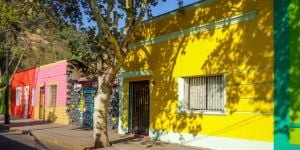
Chile is one of the safest countries in Latin America. The security environment in Chile is moderately safe, with comparatively less violent crime than in other Latin American countries.
Safety in Chilean cities
Pickpocketing, telephone scams, vehicle thefts, and residential break-ins are the most common crimes against tourists and resident foreigners in Chile. Non-violent pickpocketing is more common in Santiago than in other areas of the country, although it may happen anywhere. In downtown Santiago, the risk of being a victim of pickpocketing increases on weekends and after dark. Be particularly alert when using the subway and buses, as pickpocketing and muggings occur, many times without realizing until after the fact.
There are also many creative tactics such as poor condiments like ketchup on someone's hair to distract them while another person pickpockets them. Be aware of your surroundings, and try not to leave money and other valuables in easily accessible places.
Despite its outstanding reputation for being a safe country, some violent crime also occurs, most often in the form of carjackings, home invasions, and muggings; however, crimes like kidnappings and random shootings are almost non-existent.
Roads and transportation in Chile
Generally, taxis are a safe means of transportation, and they are equipped with a meter. It is recommended that you know the general route and price range though as some taxi drivers have been known to take advantage by taking longer routes or running the meter. Alternatives like Uber or Beat are also relatively safe, but these services are not technically allowed by law. Even so, many people use them.
Road conditions throughout most of Chile are excellent by South American standards and are comparable to U.S. roads. Roads are well-marked on city streets and highways. Traffic lights and pedestrian signals work well, but they are very often ignored. Caution should be used when driving or walking in and around Santiago. Since vehicles parked on the streets are vulnerable to break-ins in just about any neighbourhood, day or night, it is recommended that cars be parked in illuminated areas or in off-street parking facilities.
Freedom in Chile
Freedoms of speech and assembly are essential rights in Chile. Marches and demonstrations are relatively common in Santiago and generally occur with permission from the authorities on designated routes. Therefore, you will be able to avoid them if need be because the times and locations are often made public.
Although marches and protests usually commence peacefully, they can turn violent, with participants throwing rocks, Molotov cocktails, and acid at the police, who resort to tear gas and water cannons.
Finally, it is important to note that while Chilean citizens do have the right to protest, this is not extended to foreigners, even those who have residency. You may be detained and/or deported if the government finds your participation in such demonstrations to be a threat to the country.
Volcanoes, earthquakes and tsunamis in Chile
Chile is a land of volcanoes. Its borders are within the Pacific Ring of Fire, one of the most dynamically unstable and active regions on Earth. There are about 90 potentially active volcanoes in Chile. Of these, about 60 have a historical record of their activity. Despite this fact, Chile is still a relatively safe place as long as you are not living on the side of an active volcano.
There aren't a lot of deaths from volcanic eruptions in Chile and not many for earthquakes either, but the strongest earthquake in recorded history was the 9.5 quake in Valdivia, Chile back in 1960. The death toll was 1,655. Since then, there have been many construction regulations put into place so that structures are able to withstand strong quakes. For example, many newer buildings are built upon rollers, so the building actually moves with the motion of the earthquake without any severe damage.
The 2015 Chilean 8.4 earthquake - 13 dead
The 2014 8.2 quakes in Chile - 7 dead
The 2010 8.8 Chilean quake - 525 dead
So, despite all the earthquakes in Chile over the past 60 years (including the Valdivian quake), the largest in recorded history, and the death toll is less than 5,000. Many of these deaths were from the tsunami aftermath.
In general, Chile is well prepared to handle emergencies, and the building codes for public buildings in cities are good.
If you are not sure what to do in an earthquake, they say to just watch a local and do as they do. Since earthquakes are so frequent in Chile, most Chileans or long-time residents have a keen understanding of the risks of an earthquake.
Useful links:
We do our best to provide accurate and up to date information. However, if you have noticed any inaccuracies in this article, please let us know in the comments section below.








